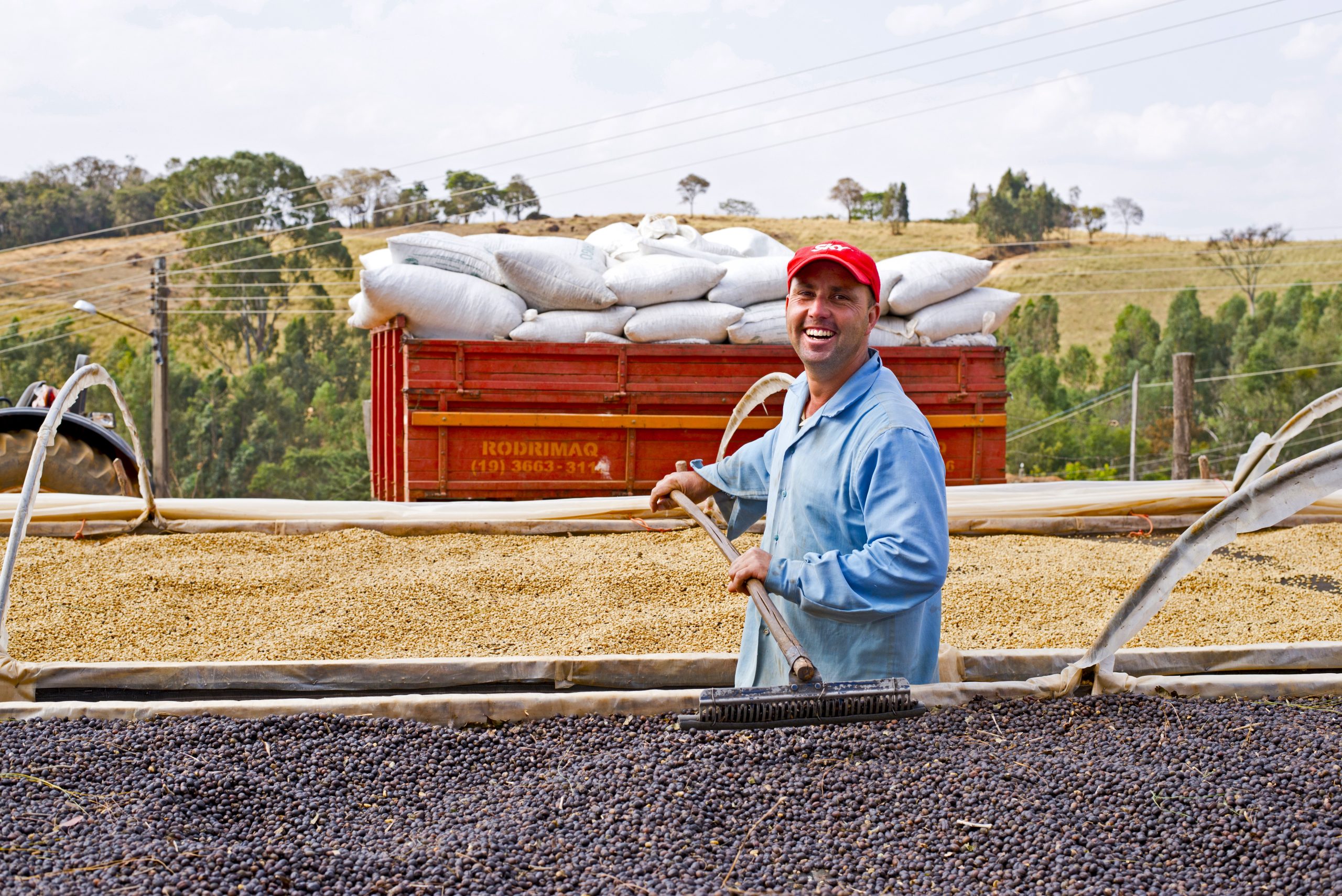Brazil Mogiana FAF Reserve Sitio Pedra Grande Natural Obata – Lot 4676 – 32456 – GrainPro Bags – SPOT RCWHSE
Position Spot
Bags 0
Warehouses Oakland
Out of stock
About this coffee
Grower
Luciano Vicente | Sítio Pedra Grande
Altitude
1200 – 1400 masl
Variety
Obatã
Soil
Latosols
Region
Caconde, São Paulo state, Brazil
Process
Natural, dried on raised beds
Harvest
June - August
Certification
Conventional
Coffee Background
Luciano Vicente is a small farmer in the mountainous Caconde area, part of the Mogiana region in Brazil. His coffee is a rare mixture of small scale and high quality, carefully picked and dried on raised beds with a lot of attention to detail. This type of production more closely mimics Colombia than the vast, mechanized estates that dominate Brazil’s coffee imagery. This particular lot, a natural processed 100% obatã, is very clean and bright, with limeade, light florals, and cashew butter.
Mogiana and its Small Farmers
The Mogiana region of Brazil is a small designation of coffee origin along the border between São Paulo and Minas Gerais states. The region has a long history of agriculture, mining, and, more recently, cash-cropping. Waves of European settlers aggressively transformed large portions of Brazil’s inland savannah over many generations of colonial development, beginning with sugar cane and then quickly favoring coffee as consumption grew across the global north. São Paulo state includes some of Brazil’s oldest coffee history, with one of the country’s first rail-to-port transportation pipelines serving the state’s main coffee port of Santos—whose title would be the namesake grade of commercial coffee from Brazil for many years.
In Mogiana, however, the landscape tends to be dense and steep, cut with deep river valleys and high ridgelines. Coffee farms here reach over 1300 meters, considered quite high and challenging for arabica in such southern latitudes.
While it’s true that 500+ hectare estates dominate Brazil’s production, still about half of the country’s coffee farmers have small, family-managed operations, processing at home and selling to local growers’ organizations to earn their living. Smaller farms tend to be clustered in the more difficult landscapes for coffee efficiency—the ones that are steep and forested, difficult to access, or at higher elevations where the climate is more challenging for coffee to thrive. Mogiana, like its neighboring Sul de Minas region, is one such area.
FAF Coffees and the “Other” Brazil
FAF Coffees is a specialty exporter in Brazil founded by the Croce family. During their years spent struggling to revive the soils of their own family farm in the Mogiana region, the Croce family connected with like-minded small growers struggling as well to make farming viable for the next generation. Over time, the Croce family estate, “Fazenda Ambiental Fortaleza” (Environmental Fortress Farm), started sharing their approach to land management, and exporting other producers’ coffees to buyers they had come to know.
Farmers working with FAF have a strong focus on their immediate ecosystems—the watersheds and canopies that made the land worth living on—as well as quality in the cup, as a means to economic independence and self-esteem. Over the years the Croce family's network of farmers grew. FAF now exports coffee on behalf of more than 250 small and sustainable farms throughout the Mogiana, Sul de Minas, and Caparaó regions. In all places they have mobilized entrepreneurial small growers dedicated to the same combination of cup quality, environmental health, and community strength, exuberantly referred to in the FAF network as “total quality”.
Sítio Pedra Grande
Sítio Pedra Grande belongs to Luciano Vicente, a second-generation coffee grower and early joiner to the Croce family’s mission of environmental stewardship. Luciano’s father Antônio first arrived to the the nearby city of Caconde when he was 15 years old. After marrying, he bought a plot up the mountain which was named Vila Vicente. Luciano and his 7 siblings were raised there on the family farm, surrounded by coffee trees.
Luciano inherited 3 hectares of his father’s land and over the years struggled to keep production up and the soil healthy. His neighbor, João Hamilton, happened to be one of FAF’s first small farmers, and shared the sustainability methods he was developing for his own farm. Eventually, in 2014, Sítio Pedra Grande began producing specialty coffee for the first time.
The immediate community around Sítio Pedra Grande is known as Serra do Cigano (“gypsy mountain”) and contains many small, 5-20 hectare family estates where much of the coffee is hand-picked and dried on raised beds. Thanks to the leadership of Luciano and other, early-adopting neighboring farms, the area has cut way back on its use of herbicides and actively protects the water quality of the surrounding valley.
Obatã is a cultivar first circulated in Brazil in 2000, and is a cross between a villa sarchi (itself a naturally-occurring dwarf bourbon mutation) and a timor hybrid. Obatã, despite it’s recent distribution in Brazil is considered excellent for quality and yield at once, particularly at higher, more challenging climates.




